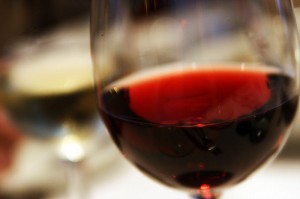 Have you ever experienced facial flushing, headaches or sinus problems when you drink a glass of wine? Or woke up with a hangover just after one glass of wine the night before?
Have you ever experienced facial flushing, headaches or sinus problems when you drink a glass of wine? Or woke up with a hangover just after one glass of wine the night before?
A wine allergy may not be your first conclusion from those symptoms above, but if you experience negative reactions when drinking a glass of wine, you may have a sensitivity to this popular drink.
It is difficult to pin-point exactly what someone is allergic to in a glass of wine. In addition to certain pesticides and herbicides that may be used in the grape-growing process, there are almost 200 additives that are legally permitted in wine. These additives, other than sulfites, are not listed on the back of the wine bottle. Some common additives are sulfur, yeast, sugar, calcium carbonate and maltol.
A common allergic reaction is to the sulfites in the wine. Most 750ml bottles of wine can have up to 250ppm (parts per million) of sulfites added. This amount of sulfites may cause negative symptoms in many people.

Rather than avoid wine entirely, we have a few recommendations that may allow you to enjoy this drink, without the nasty after-effects.
Number 1:
Have a treatment for alcohol!
Come in to Advanced Allergy Solutions to treat your reaction to alcohol. Once this sensitivity is cleared and you begin to drink cleaner wine, those pesky negative side effects may lessen.
Number 2:
Drink natural wine.
Although there is not technical definition for natural wine, a common description is wine made with the least amount of chemicals, additives (like sugar, acidifiers, powdered tannins and sulfites) and technological manipulations. Natural wines include organic or biodynamic grape growing.
Natural, clean wine typically does not contain many of the chemicals used during the grape growing and winemaking process of conventional wines. The lack of additives may significantly decrease negative symptoms in someone after having a glass or two of wine.
Organic wine means the grapes were grown organically, without any pesticides or herbicides. However, this does not keep the 200+ additives out of the wine during the winemaking process. Get to know the wineries making organic wine and learn more about their winemaking process.
Biodynamic grape growing, which views the vineyard as an ecological whole, uses herbal sprays, composts and works in line with the lunar calendar. This growing and winemaking process uses no chemicals or additives (other than a low amount of sulfites) and is typically the cleanest kind of wine.
How do you find clean wine?
Look for wines that had their grapes grown organically or biodynamically. It’s a good idea to make sure that no chemicals or herbicides were used during the grape growing process as well. Wines made with low to no filtering and low to no sulfites are also good, clean choices.
As the holidays approach, look for natural, clean wines to bring to parties or family gatherings. Your wine list will expand and you and your guests might not experience as many negative side effects.
Enjoy the holiday season!
l
Resources:
If You Are a Wine Drinker, Here Are Facts You Should Know

